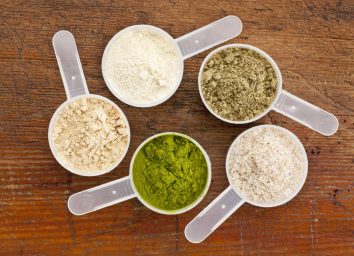The Amazing Health Benefits of Spiking Your Coffee With Protein Powder

Concerned about getting enough protein with your morning breakfast? You might consider adding protein powder to your coffee. But does it really work, and is it safe?
We spoke with two registered dietitians—Monica Auslander Moreno, MS, RD, LD/N and founder of Essence Nutrition, and Sameera Khan, RD, PA-C, and founder of LowKCalPal—to find out more about the potential benefits and downsides of adding whey, collagen, or soy protein powder to your morning cup of joe.
Read on to find out why you might want to grab some protein powder of your own, how to prepare it so that it's effective as well as delicious, and what kinds of protein powder work best as a nutritional supplement.
What are the benefits of adding protein powder to coffee?
Protein powder can be especially helpful if you're not a "breakfast person," says Moreno. Those who prefer to grab-and-go with just coffee can get an extra boost of energy, nutrition, and protein by mixing some powder in with their daily Starbucks.
"Enhancing your coffee with protein powder can be an effective method to optimize protein intake, especially for people who refuse to eat a proper breakfast in the morning and who prefer to just have coffee," Moreno says. It's also a great way to get ready to hit the gym in the early morning hours if you just can't stomach a full breakfast, she says: "This can render your coffee drink to be more of a 'complete' meal and fuel a workout."
Both RDs agree that the most important benefit of adding protein powder to your coffee is the balance it provides. Coffee gives you that get-up-and-go feeling, while the protein can help you get a little more grounded in your day and in your body.
"While the protein powder added to coffee has an anabolic effect in repairing and building the body, the catabolic effect of coffee tends to release stored energy," Khan says. "Strength from the protein powder and energy from the coffee is the perfect way to start the mornings."
But a protein boost isn't the only benefit of some added protein powder. Khan explains that adding whey protein powder to coffee offers a host of health benefits, from improved cognitive function and insulin sensitivity to better heart health, improved digestion, weight control, and boosted metabolism. Most protein powders also provide "half the daily value of vitamins A, B, and C," says Khan, and they can even increase serotonin levels and decrease cortisol levels.
Can you put protein powder in your coffee if you have a sensitive stomach?
Although some people say that adding protein powder or another source of fat and carbs helps ease the morning nausea and irritation some feel after drinking their coffee, Moreno is skeptical about how much of a difference it will really make. "If your stomach is sensitive, you may be sensitive to coffee/caffeine no matter if it's consumed alone or with food," she says. The RD adds that this "is less likely to cause an issue if taken with food."
Khan, meanwhile, suggests that protein powder may help those who experience a bit of acid reflux after their morning java. "It's not the actual coffee, but the caffeine molecule in the coffee that causes the stomach to produce more acid irritants than usual," she says. "Caffeine relaxes the lower esophageal sphincter, worsening any symptoms of acid reflux. Drinking coffee with alkaline-friendly, plant-based foods helps to strike the right balance."
In addition to the acid reflex that can accompany caffeine, protein powder and coffee could result in a rather unpleasant texture if you're not careful. To avoid the chunkiness, here are a few ways to put protein powder in coffee that are still delicious.
The best protein powder coffee recipe
To avoid a chunky texture and unpleasant aftertaste, Khan suggests choosing your protein powder carefully and following a recipe rather than simply stirring it in. She suggests using Vital Proteins collagen creamer, which comes in cocoa, vanilla, and banana flavors. Khan also likes Biotrust's low-carb blend, which comes in different flavors and "contains 24 grams of grass-fed protein with gut-friendly probiotics and increased bioavailability."
Moreno, meanwhile, recommends RSP True Fit's grass-fed whey protein powder, which can be seamlessly stirred, blended, or frothed into a cup of coffee. "Even if you were to just use half a scoop, that would still give you almost two eggs' worth of protein in one serving," she says. She also suggests RSP's AvoCollagen protein powder, which "combines 10 grams of protein from collagen with beneficial fatty acids that can spruce up a brew."
As for the creamiest, tastiest ways to jazz up the protein in your morning coffee, Moreno has three suggestions, including a blended frappe and a protein-packed cold brew. Khan, meanwhile, shared the following recipe for a delicious coffee drink powered by collagen powder.
Grass-fed, collagen-blended coffee recipe
Ingredients
1 cup black hot coffee
½ scoop grass-fed unflavored collagen powder
1 Tbsp ghee
How to Make It
- Pour hot coffee into the blender first.
- Add collagen protein powder after you start the blender.
- Add a Tbsp of ghee.
- Remove insert of blender cover for steam to escape.
- Blend well for a foamy beverage and enjoy.
If you've been on the fence about combining protein and coffee, you might be pleasantly surprised by the result. Give this recipe a try—you might just find your new go-to breakfast!








